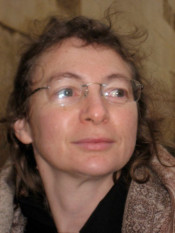Rallying against the invader: anthology of 100 Russian anti-war poems is launched

An anthology of 100 poems by writers in Russia, Ukraine and the Russian diaspora expressing their outrage and disbelief about Vladimir’s Putin’s invasion of Ukraine has been published on the first day of 2023 by Smokestack Books. The anthology has been collected by an international group of poets and translators for the Kopilka (‘Piggy-Bank’) project, aimed at collating poems about the war. In an interview with Write Out Loud, editor Julia Nemirovskaya, pictured, a Moscow-born poet and author who emigrated to Sweden, and now teaches at the University of Oregon in the US, said: “When the war started, I was distraught, to say the least. It was very personal for me on many levels. My husband’s family is from Kyiv, whereas our oldest child lives in Moscow. I didn’t know what to do but I needed to do something …

Tatiana Voltskaya is a Leningrad-born poet and journalist. She left Russia after the invasion of Ukraine, and now lives in Tbilisi, Georgia. Her anthology poem talks of a grandfather’s second world war medals, earned during the siege of Leningrad, now “tarnished” by the current war in Ukraine: “I hear your voice, Grandad. You say: / We died around Moscow – why? / For a Russian man to come, by and by / And widow a Ukrainian mother?/ Cain, Cain, where is Abel your brother?”
Poet and translator Galina Itskovich was born in Odesa, and now works as a psychotherapist in New York. Her poem ‘Crisis Therapy’, denounces a “hell-load of sadists … these orcs”. In another poem, ‘War is a Train’, an elderly woman is confused and thinks she is back in the second world war, during the German invasion of the Soviet Union in 1941 (“war belonged back in her childhood”). The poem ends:
Please, don’t grow up, mom,
don’t continue this saga into Monday,
don’t live in fear of Tuesday,
stop and stay in that ’41 of yours,
so that I’ll never have to be born
to encounter your own terror,
that persistent mortal dread
on the faces of the kids just brought out of Bucha.
Eugene Kluev, who moved to Denmark in 1996, feels Russians have lost any moral place in the world: “I’ve lost my right to have a voice, a vote: / I’m Russian.” Olga Levskaya, who teaches in Siberia, writes about misuse of the word ‘peace’: “Peaceful planes glide in formation like geese, / tanks jingle peacefully. / Someone is peacefully murdered for peace.” In ‘Don’t Kill’, a poem of savage irony, Julia Pikalova lists Orwellian state propaganda, language turned upside down: “What we do to them we do as a friend.” She was born in Moscow, and now lives in Italy.
All the poems are printed in Russian, with the English translation alongside. The translators are Maria Bloshteyn, Andrei Burago, Richard Coombes, Anna Krushelnitskaya, and Dmitry Manin. The book's cover image is by Maria Kazanskaya.
Disbelief: 100 Russian Anti-War Poems is published by Smokestack Books on 1 January 2023
Interview: 'When the war started I was distraught'








Stephen Gospage
Fri 7th Apr 2023 21:55
Having read these poems, I feel even more enthusiastic. If we are not moved by verse like this, our world is becoming a very sad place. Poetry like this should change the world. If it does not, the world is at fault.
Bravo to everyone involved!